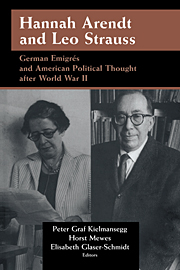Introduction
Published online by Cambridge University Press: 05 January 2013
Summary
German emigration after 1933 and the development of political theory in the United States - does this comprise a single topic? Indeed, it does. A number of prominent names come immediately to mind, names of German Jews who, banished by National Socialism, found refuge in the United States, where they became engaged in the development of philosophy and the theory of politics, making significant, indeed definitive contributions. The list includes not only Hannah Arendt and Leo Strauss, of course, but also Herbert Marcuse and Hans Morgenthau - to name only the four most influential of these refugee intellectuals.
These scholars have more in common than merely their German-Jewish origin, the fate of being expelled from Germany, their new home in America, and the significance that they achieved as political theorists and philosophers in the United States. All of them had already completed their academic education in Germany (Hannah Arendt, the youngest of the group, was twenty-six years old in 1932; Leo Strauss was seven years older) and thus brought with them the imprint of the educational traditions of their native country and continent. But all of them, starting at different levels, attained their characteristic intellectual profile only after emigration. Their contributions to the history of political thought in the twentieth century were all published in the United States.
- Type
- Chapter
- Information
- Hannah Arendt and Leo StraussGerman Émigrés and American Political Thought after World War II, pp. 1 - 8Publisher: Cambridge University PressPrint publication year: 1995

